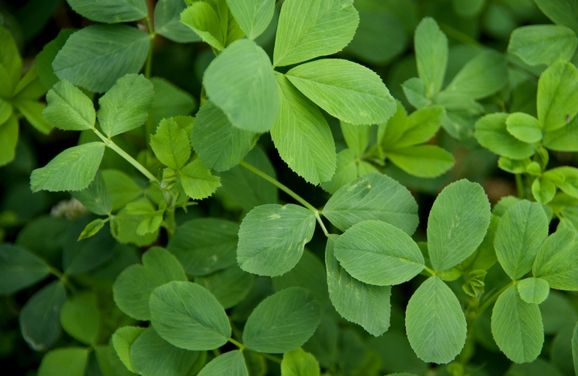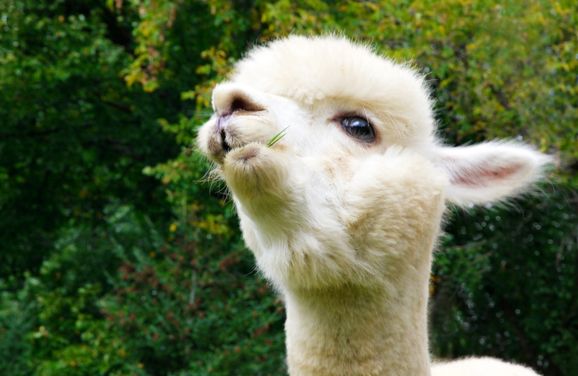Alpacas are one of the most adorable and playful creatures that beautify the animal realm.
Inquiring about the proper diet of these delightful creatures is vital to keeping their health thriving.
One of the many questions that alpacas owners ask is, “Can alpacas eat alfalfa?”
Alpacas can eat alfalfa; in fact, this food is considered a staple in their diet because it contains a high nutritional value that is good for their well-being.
Just make sure to serve it in moderation and include other healthy food in their diet, such as grains, vegetables, and hay.
Keep reading to explore more interesting information about feeding alpacas alfalfa, how to do it, how much they can consume, its benefits, and other alternatives.
What is alfalfa?
First of all, let’s begin by defining alfalfa.
Alfalfa is a green herb also named purple medic or lucerne, and it is a leguminous plant that belongs to the pea family called Fabaceae.

Alfalfa is a plant that is considered highly nutritional, which explains its increased usage as a feed for various kinds of livestock, for instance, horses, cows, and also alpacas.
This plant thrives in different places around the world.
It has been used for hundreds of years and is widely consumed in the United States and South America, as farmers use it to feed their livestock.
What are the nutritional values of alfalfa?
This plant contains excellent nutritional values such as protein, minerals, and numerous vitamins.
Here is a list of different vitamins and minerals that alfalfa retains:
- Vitamin A
- Vitamin K
- Vitamin E
- Vitamin D
- Potassium
- Calcium
- Phosphorus
So, we can say that the abundance, the nourishing nature, and the rich amount of vitamins and minerals make alfalfa one the best food to give alpacas to maintain a well-balanced diet.
So, can these fuzzy buddies safely feast on alfalfa?
After discovering the nutritional values of alfalfas, we can confidently say that alpacas can safely consume this food.
Alpacas can eat alfalfa because it holds many vital vitamins and minerals that are essential for these fluffy pals’.

Eating it regularly ensures that alpacas meet their needs in terms of nutrition and sustain their daily requirements to maintain good health.
However, we should keep this in mind as pet owners; moderation is key when feeding our animals.
To maintain a well-balanced diet, feeding alpacas alfalfa in proper portions is highly required to not cause an upset stomach to your animal.
What is the amount of alfalfa that should alpacas consume?
Generally, alpacas should consume 2-3% of their body weight in alfalfa per day.
When it comes to feeding alpacas (or any other animal), a limited portion is a crucial guideline to follow.
Eating too much of the same food can lead to health issues over time.
For instance, overfeeding alpacas alfalfa can cause digestive troubles, liver damage, obesity, and an increased risk of certain diseases such as urinary calculi.
To avoid over-consumption of alfalfa, provide a balanced diet that contains other ingredients.
Plus, always ensure their daily food intake is balanced and aligned with the recommended amount.
What are the benefits of feeding alpacas alfalfa?
Alfalfa is a highly nutritious feed that significantly benefits your fuzzy friend.
As long as they eat it moderately and in the advised amount (2-3% of their body weight in alfalfa per day), alfalfa can be really wholesome.
Here are the four main benefits of feeding alpacas this nutritious plant.
1. Good for digestion
Alfalfa is rich in fiber which can keep the digestive system optimal and strengthen it and also prevents any future stomach upsets.
2. A plentiful supply of different minerals and vitamins.
This green herb is rich in vitamins A, K, and D as well as phosphorus and calcium.
These vital elements contribute to the well-being of your alpacas by boosting their health and also increasing their energy levels.
3. Great source of protein
Protein is a crucial element that increases the alpaca’s growth, boosts its strengths, and raises the chances of its reproduction.
So, feeding alpaca this plant allows it to require the necessary protein intake that contributes to all the listed benefits.
4. Good for lactation
Alfalfa is particularly good at helping alpacas to produce milk which is advantageous for the growth of baby alpacas.
5. Healthy teeth
Feeding alpacas this plant is suitable for their teeth health, and this is because of the fiber that contributes to reducing any buildup of tartar.
Another food options for our fluffy friends
As an alpaca owner, you should be aware that you must diversify your animal’s diet by including other varieties of food.
Here are some other food alternatives you can feed alpacas besides alfalfa.
First, we have vegetables such as cabbage, apples, or carrots, which can supply your fluffy animal with various vitamins and minerals that keep its diet well-balanced.
To diversify alpaca food, you can mix alfalfa with grass hay; this will create a good source of fiber that promotes the health of your animal’s digestive system.
Third, we have pellets, a vital option for well-balanced nutrition.
This food provides this fluffy animal with high nutritional ingredients such as roughage, grains, as well as added minerals and vitamins.
Related questions
Can alpacas eat alfalfa pellets?
Alfalfa pellets are dried and compressed versions of alfalfa hay.
Alpacas can eat alfalfa pellets because they supply them with multiple minerals and vitamins and are rich in protein and fiber.
Yet, as a rule of thumb, alpacas should not rely on the same feed, its diet must be diversified and well-balanced.
So, Alfalfa pellets should be a part of their eating menu and not their primary source of nutrition.
Besides diversifying the diet of your fluffy buddy, water is a crucial part that should not be neglected.
Alpacas should always have direct access to clean, fresh water for hydration and to prevent stomach issues.
Can alpacas eat alfalfa hay?
Alpacas can eat alfalfa hay because it is suitable for their overall health. Its nutritional value, such as fiber, protein, and plenty of vitamins, creates a nutritious and well-balanced meal.
Just make sure to choose high-quality alfalfa hay that is free from dust to keep the respiratory system of your animal intact.
Plus, choosing alfalfa hay that is free from contaminants and mold is crucial to protect the digestive system of your alpaca from toxins and harmful substances.
What is the best grass to plant for alpacas?
The best grass that is suitable for alpacas is the one that is rich in fiber and protein.
The best grass option to plant for your fuzzy pal is fescue, clover, timothy grass, orchard grass, and brome grass.
An essential thing to keep in mind when planting grass is maintaining it well by preventing it from overgrazing and removing any grown poisonous plants.
Conclusion

Alpacas can eat alfalfa as a vital part of their diet. This plant contains essential vitamins and minerals that help alpacas maintain good health. Yet, you should keep in mind to diversify the diet of your fluffy friend by including vegetables, hay, and grass for a well-balanced diet.
Plus, when feeding alpacas alfalfa, make sure to avoid overfeeding (the amount should be 2% or 3 % of their body weight) and pick high-quality alfalfa.
Leave a Reply